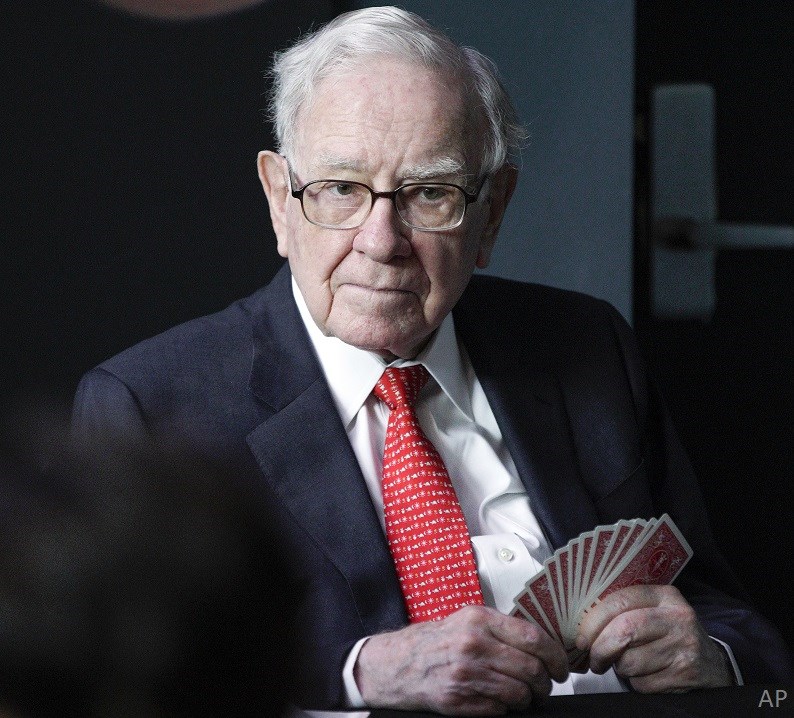
"Life is like a snowball. The important thing is finding wet snow and a really long hill."
--Warren Buffett
Berkshire Hathaway (BRK.B) CEO Warren Buffett is probably as famous for analogies like these as he is for his success as an investor. You can find Buffett quotes about life and money on everything from decorative plaques to needlepoint pillows.
But what's so compelling about these little bits of wisdom is that they often contain a simplified blueprint of Buffett's success in one concise and witty package.
For example, the "really long hill" is arguably the most powerful wealth-creation tool Buffett has, and it's something investors have at their disposal as well: time. Many fortunes are made slowly, by patiently holding stocks through good times and bad, and reinvesting the dividends. This is the part of investing that tests one's temperament.
Finding the "wet snow" is the part that requires some skill. Buffett is particularly good at sniffing out businesses with economic moats, or competitive advantages. Companies with wide moats can fend off competition and earn high returns on capital for years. The secret to Buffett's success is taking the excess cash flows generated by these companies (as well as the float generated by Berkshire's insurance operations) and investing them back into projects that earn more than their cost of capital over extended periods of time. And there you have it--a wealth-creating snowball.
When snowballs get really big, though, their momentum slows. Berkshire had $128 billion in cash equivalents in its coffers as of the end of 2018, according to its shareholder letter. It may seem like there's nothing Buffett and Berkshire can't do with all that money. But the truth is, the conglomerate's days of being nimble enough to take advantage of small-cap, fast-growing opportunities are behind it. It's a lot harder for a business to grow its earnings when its market cap is $520 billion, as Berkshire's is, than when it's $1 billion, for example. If Berkshire were to take an interest in a small-cap stock with rapidly growing earnings, that business wouldn't have a meaningful impact on Berkshire's overall earnings growth.
Individual investors, though, have opportunities available to them that Berkshire is probably too large to take an interest in. We screened the small- and mid-cap stocks (market caps of less than $15 billion) in our coverage using some of Buffett's famous investing criteria. First, we looked for positive free cash flows and returns on equity of more than 10% in each of the past three years.
Then we focused on only firms with wide Morningstar Economic Moat Ratings--that is, the "wet snow" companies that will reliably generate excess cash flows. Within that subset, we homed in on stocks with fair value uncertainty ratings of medium or low, which means our analysts are more confident about the stock's fair value estimate because they can estimate its future cash flows with a greater degree of confidence.
John Wiley & Sons (JW.A)
Price/Fair Value: 0.8 (undervalued)
Market Cap: $1.9 billion
Fair Value Uncertainty: Medium
Economic Moat: Wide
Moat Trend: Negative
Wiley’s crown jewels are the journals in its research publishing and platforms business, which comprised just over half of the company’s fiscal revenue in 2019. Analyst Zain Akbari explains that many of Wiley’s journals are prestigious and long-established publications targeted to narrow, specialized audiences. Wiley’s individual journals often face little competition as upstarts have neither the scale nor the breadth that Wiley’s portfolio provides, Akbari says. This also helps give Wiley better access to libraries, as the firm can offer a bundled set of titles.
Akbari believes Wiley’s other businesses also have advantages, though not to the same degree as the journals segment. The education publishing and professional learning segment (39% of fiscal 2019 revenue) contains the firm’s books and reference materials offerings, which face challenges as print books continue to fall out of favor.
The education publishing and professional learning segment also includes Wiley’s course workflow and test preparation and certification offerings (including materials for the CFA and CPA exams), areas where Akbari sees advantages resulting from switching costs: Switching to a different course workflow provider is difficult because it requires retraining professors and students to use a new tool, while testing bodies are reluctant to incur the cost of overhauling materials alongside a different partner.
Landstar System (LSTR)
Price/Fair Value: 1.1 (fairly valued)
Market Cap: $3.9 billion
Fair Value Uncertainty: Medium
Economic Moat: Wide
Moat Trend: Stable
Trucking and transportation services provider Landstar System’s vast network of shippers, truckload carriers, and independent sales agents create a formidable competitive advantage, in analyst Matthew Young's view. And Young believes Landstar's immense network will remain valuable to shippers: The more parties (suppliers and customers) that use a truck broker's network, he explains, the more powerful that network becomes. Attempts to duplicate this network by small providers with fewer resources--while not impossible--would be very difficult.
Landstar is an “asset-light” third-party logistics provider, which means it owns a fleet of trailers, but it doesn’t own the trucks (which are called tractors) that pull the trailers. To haul freight, Landstar relies in part on captive owner-operators who receive a fixed percentage of revenue and haul exclusively for Landstar, as well as unaffiliated third-party carriers, explains Young. This has allowed Landstar to enjoy a variable cost structure with relatively low capital intensity that generates solid returns on capital--more than 30% on average over the past five years, Young said.
Aspen Technology (AZPN)
Price/Fair Value: 0.8 (undervalued)
Market Cap: $6.4 billion
Fair Value Uncertainty: Medium
Economic Moat: Wide
Moat Trend: Stable
Aspen Technology is a leading supplier of process automation software for complex industrial environments. Analyst Dan Romanoff explains that Aspen’s “AspenOne” software platform helps improve process-oriented plant efficiency, which helps lower capital intensity, increase working capital efficiency, and improve margins.
Aspen enjoys very high customer renewal rates--in excess of 95%, Romanoff says. A big part of Aspen’s competitive advantage has to do with switching costs--customers are loathe to switch to a new solution from a different software provider because the risk is simply too high that it wouldn’t work as well; Aspen’s software solutions are generally a low-cost item that generates a high return on investment and is typically “mission critical” to operating a multibillion-dollar facility, Romanoff explains.
Romanoff also thinks Aspen has advantages in the form of long-standing customer relationships, superior technology, and know-how (the company has some patents on its software solutions). Romanoff expects Aspen’s market share to grow over the next decade as management adds features to the AspenOne platform and the company moves more meaningfully into areas outside of its core markets.
Graco (GGG)
Price/Fair Value: 1.0 (fairly valued)
Market Cap: $7.5 billion
Fair Value Uncertainty: Medium
Economic Moat: Wide
Moat Trend: Stable
Graco is an industrial firm that differentiates itself by manufacturing specialized products that handle difficult-to-move liquids, often used for niche applications where competition is limited. The firm offers a range of products, including pumps used to move peanut butter or caramel, automotive paint spray systems, and injection pumps for the oil and gas industry.
As analyst Krzysztof Smalec explains, Graco’s main competitive advantage is due to customer switching costs: Graco is a leading manufacturer of equipment used for managing fluids, and its portfolio includes a wide array of niche products with little direct competition. The firm specializes in moving materials that are abrasive, viscous, or corrosive, which inherently create more wear and tear on pumps and other equipment. Graco’s engineering capabilities, reputation for quality, and experience with handling difficult-to-move liquids are key differentiators that have allowed it to establish a strong competitive position across all the markets it competes in, Smalec said. He adds that Graco’s wide moat is also protected by intangible assets, including its strong brand name, patent portfolio, and reputation for quality, which allow the company to command premium pricing.
Allegion (ALLE)
Price/Fair Value: 1.0
Market Cap: US$ 8.9 billion
Fair Value Uncertainty: Medium
Economic Moat: Wide
Moat Trend: Stable
Although Allegion is a major player in the global security products market with particular strength in the Americas (73% of sales), you may not be as familiar with the company's name as you are with its branded products. Within North America, Schlage (locks), Von Duprin (exit devices), and LCN (door controls) hold leading market positions within their respective product categories, while CISA and Interflex are leading brands in certain European markets. As analyst sector director Brian Bernard explains, Allegion's portfolio of well-recognized and long-established brands are associated with superior quality and durability in both residential and commercial markets, which gives the firm pricing power. Perceived quality and durability are critical considerations, given that the cost of failure can be very high.
Despite competition from formidable competitors, Allegion has consistently capitalized on its brand equity, strong distribution network, and large installed base to drive excess returns. Since the company's 2013 spin-off from Ingersoll Rand (IR), Bernard estimates the firm has generated an average return on invested capital of about 23%, well above its weighted average cost of capital.
Price/fair value estimates as of April 24, 2020.
Understand the rules of responsible investing
Learn about how ESG regulations affect investors and managers in our latest report























